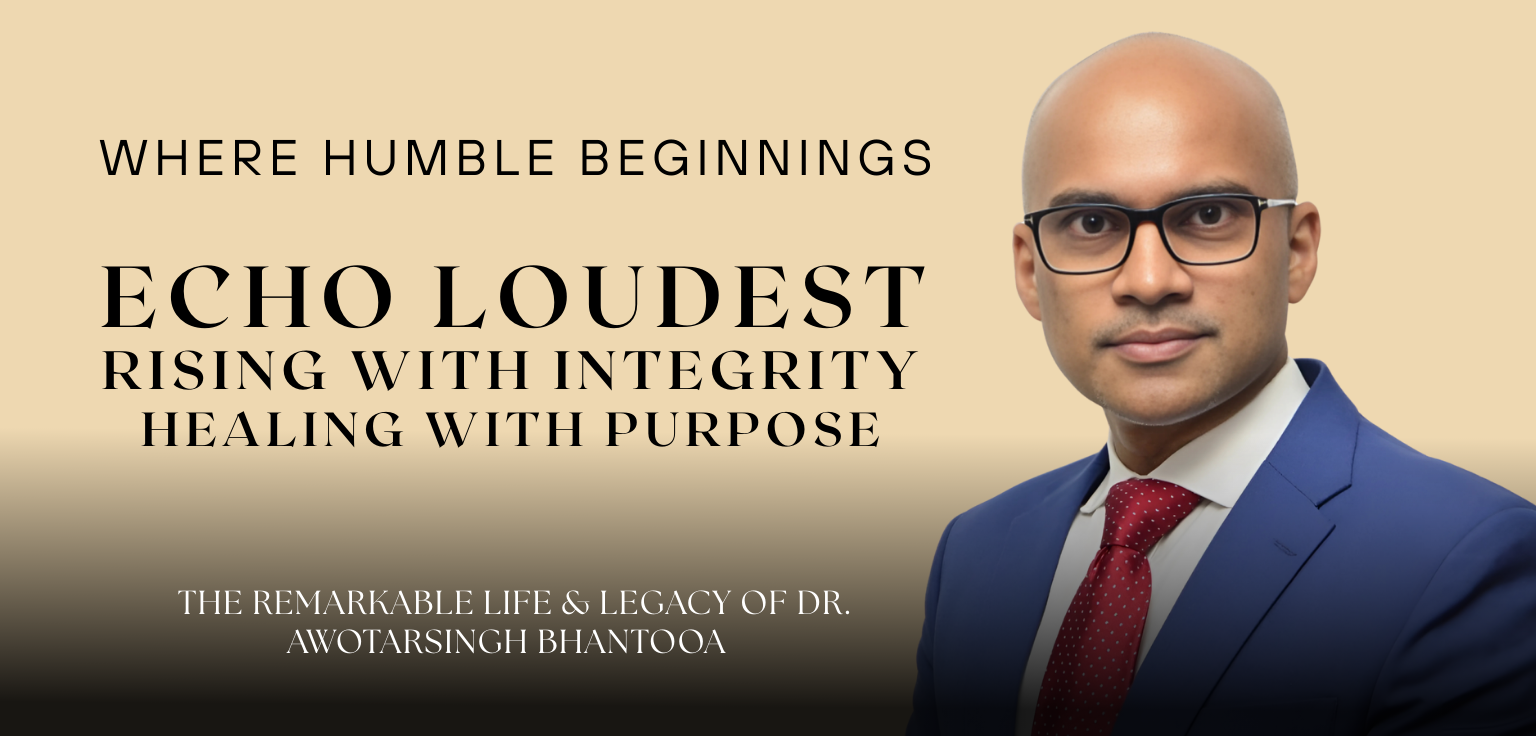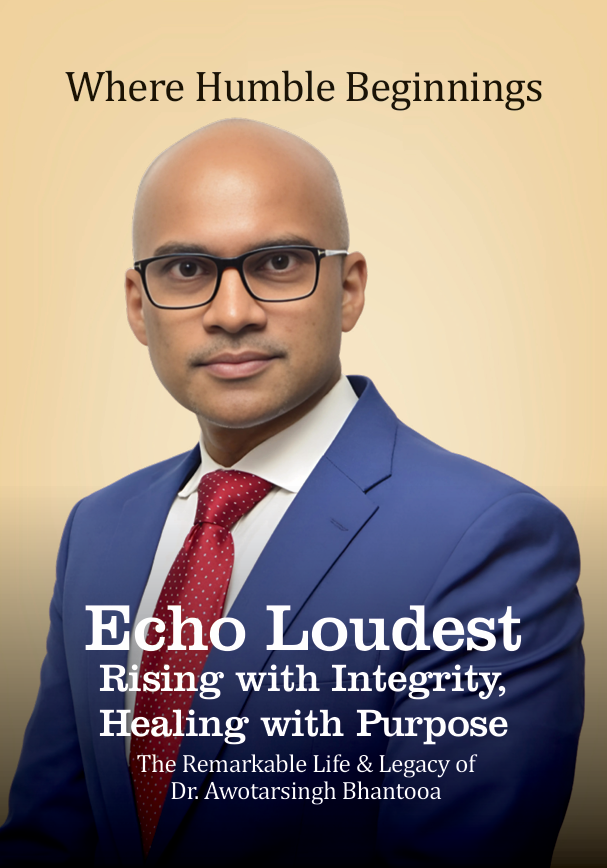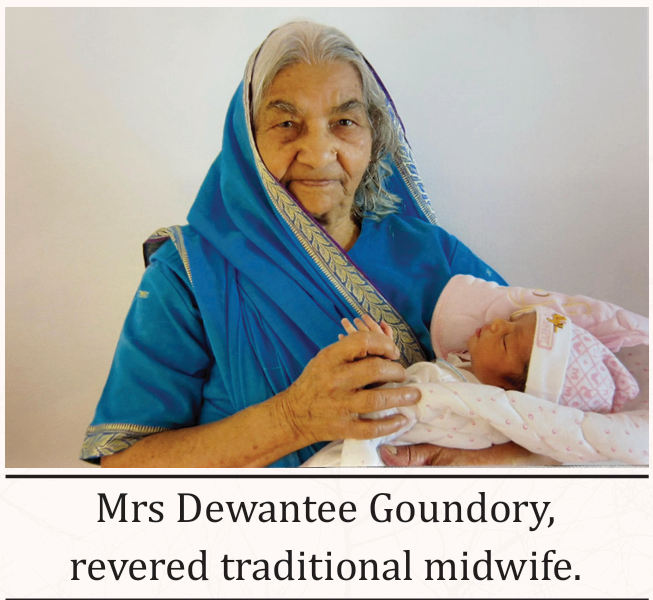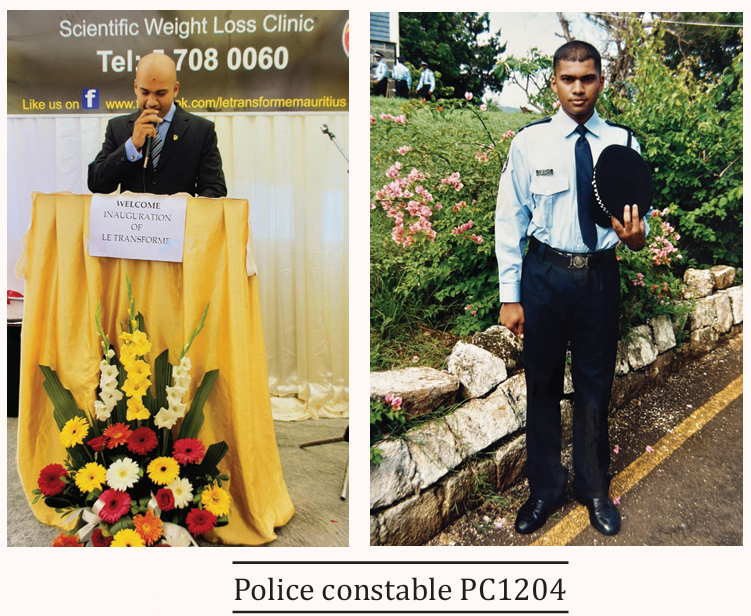

“Leadership is not about titles; it’s about the courage to start small and the strength to stay honest.”
Introduction
“I was not born into comfort, but into struggle—and from that struggle, I drew my strength. From that strength, I found my calling in service. My legacy, I believe, will not be measured by what I gained, but by what I gave.”
— Dr. Awotarsingh Bhantooa
In the life of Dr. Awotarsingh Bhantooa, we encounter a rare blend of discipline and humility, intellect and empathy, ambition and altruism. A respected healthcare professional, community leader, and cultural advocate, Dr. Bhantooa stands as a living testament to the quiet power of perseverance and the enduring influence of values inherited from humble beginnings.
Born into modest circumstances in rural Mauritius, his early years were shaped not by privilege, but by profound life lessons—handed down not through institutions, but through intergenerational wisdom, familial sacrifice, and the sacred rituals of survival. His formative experiences—from making traditional ice cream with his family as a boy to watching his father embody tireless work and unspoken generosity—laid the foundation for a life rooted in effort, gratitude, and service.
Today, Dr. Awotarsingh Bhantooa is widely regarded for his contributions to the field of physiotherapy and rehabilitation. As a skilled practitioner and clinic in-charge, he has helped hundreds reclaim their strength, mobility, and hope. His leadership extends beyond medicine; as a committed figure in the Arya Samaj movement, he champions cultural integrity, ethical living, and youth mentorship. His name carries the weight of trust—in the hospitals of Pamplemousses, and among the families who see in him a symbol of what honest dedication can become.
What distinguishes Dr. Bhantooa is not only what he has achieved, but how he has achieved it—with quiet determination, deep introspection, and an unwavering moral compass. He is a man who believes that the true test of success is not personal elevation, but the ability to lift others along the way.
This biography does not merely recount milestones; it explores the evolution of a soul—a boy who once stirred custard in aluminium tubs, now stirring change in lives and communities. It is a journey marked by storms weathered, doors opened, and a vision of leadership inspired by conviction rather than charisma.
Through these pages, readers will not just discover the life story of a notable Mauritian son. They will uncover the architecture of integrity, the poetry of purpose, and the roadmap of a life lived meaningfully—from quiet beginnings to earned distinction.
Dr. Awotarsingh Bhantooa is not just a man of achievements. He is a man of values.
And in these times, that may be the greatest distinction of all.
PHASE 1: The Roots of Life
“Before I could write my name, I had already memorized the rhythm of resilience, sung to me by winds, woven through corrugated iron, and carried by the heartbeat of a village that taught me how to stand before I could walk.” — Dr. Awotarsingh Bhantooa

On the 19th of June, 1981, in the dusky quiet of a modest village in rural Mauritius, a boy was born—not within the sanitized walls of a hospital, but in the warm, lived-in simplicity of his grandparents’ home. That boy was Dr. Awotarsingh Bhantooa. His entrance into the world was not marked by the presence of doctors or machines but by the knowing, experienced hands of his grandmother, Dewantee Goundory, a revered traditional midwife whose legacy would later become a quiet but defining symbol of strength in his life. She, like many women of her time and community, had not studied in universities or read modern medical books, yet she held centuries of ancestral wisdom in her bones—an instinctual knowledge passed down orally and practically through generations. She lived to the awe-inspiring age of 103, long enough to see the infant she welcomed with sacred care grow into a man of education, distinction, and service.
The Bhantooa family’s roots were deeply entrenched in the soil of that small Mauritian village. They belonged to the humble class—the kind of family that worked not for luxury, but for sustenance. His mother, Mantee Bhantooa, was a homemaker, the beating heart of the household, who made sure the little they had stretched as far as it could. Her work was never paid in currency, but in warmth, dignity, and the survival of her children. His father, Janmajaye Bhantooa, was a lorry driver, a profession demanding strength and sacrifice. He spent his days navigating rough roads, often with long hauls, returning home after dark, his hands calloused from labour but always ready to lift a tired child into his arms. Theirs was a household run not by wealth, but by willpower.
The home itself was modest—its walls made of timber, and its roof fashioned from corrugated iron sheets that responded melodiously to the island’s weather. When it rained, the drops drummed rhythmically above their heads, as though the sky played lullabies to the children sleeping below. This sound—often comforting, sometimes frightening—became the soundtrack of Dr. Bhantooa’s early life. It was a house that bore witness to both hardship and joy, echoing laughter, arguments, lullabies, and prayer.
He grew up in a time when Mauritius was far from the infrastructurally advanced nation it has now become. Electricity was unstable or non-existent in parts of his village, and water came not from taps, but from communal wells or central water authority domestic water supply also known as “LA FONTAINE”. The family did not shop for food—they grew it. Every edible leaf, fruit, or root was cultivated through labour. Vegetables were grown in the backyard, fruit trees were tended to carefully, and food waste was never an option—it was composted or repurposed. They mostly relied on Vegetarian diets.
PHASE 2: The Road to Knowledge
“A child’s footsteps to school may seem small to the world, but
when those steps are taken with hunger, hope, and grit, they
lead to horizons beyond imagination.”
- Dr. Awotarsingh Bhantooa

Education, for many, is a phase. For Dr. Awotarsingh Bhantooa, it was a pilgrimage—one that began humbly and continues even today in spirit and purpose. His academic life is a testament not just to the accumulation of knowledge but to a deeper evolution of the soul, shaped by discipline, sacrifice, and unshakable family support.
The journey into formal education began when Dr. Awotarsingh Bhantooa was just three and a half years old. In a rural Mauritian village where blackboards and chalk were more accessible than toys, he was introduced to the structured world of learning. Each morning, under the tender watch of his mother or grandparents, he would set off on foot, walking nearly 800 meters to the small pre-primary school. This was not a path carved out by modern convenience, but unpaved and damaged roads shaded by the graceful arc of Filao trees and mango canopies, their roots and branches seeming to whisper blessings upon his young journey.
In that humble classroom, far from the digital noise and distractions of modernity, he first recited the familiar “A for apple, B for ball, C for cat.” These rhythmic chants were more than just phonetics—they were seeds sown into the soil of a mind that would one day flourish across disciplines. The wooden benches, the chalky air, the scent of coconut oil in children’s hair—all of these became part of his earliest memory-scape of education. These were not just years of learning; they were years of awakening.
At the age of five, a new chapter unfolded with his enrolment at a Roman Catholic Aided (RCA) primary school. A sense of formality entered his life. He donned a pale blue shirt and dark blue trousers—his first school uniform—and with it came an identity, a sense of belonging. The canvas shoes he wore may have been basic, but they made him feel like he was stepping into something bigger than himself.
The curriculum at the RCA school was academically diverse and rigorous. English was the primary medium of instruction, but students were also expected to master French, Hindi, mathematics, and geography. This multilingual and multicultural exposure helped build a foundation that not only sharpened young Awotarsingh’s intellect but also prepared him for a pluralistic worldview—an asset that would later define his academic and professional philosophy.
In Mauritius, the Certificate of Primary Education (CPE) is more than just an examination—it is a rite of passage. The six years of primary schooling culminated in this high-stakes assessment, which determined a child’s educational future. It filtered who would proceed to high school and which type of school they would attend. The weight of this expectation was not lost on him. Even as a child, he understood that passing the CPE would be a pivotal turning point.
The Mauritius of the 1980s and early 1990s was a country still in the throes of development. Resources were limited. Infrastructure in many government-aided schools remained basic, and students often depended on community support and donor programs. One such initiative that remains vividly etched in Dr. Awotarsingh Bhantooa’s memory was the distribution of food items at school. At around 10 a.m. each day, children would receive servings of milk, bread, cheese, and occasionally dry raisins. For many—including Dr. Bhantooa—these were not just snacks. They were nourishment, a brief taste of luxury in an otherwise frugal life.
The milk was always warm and fresh, the cheese velvety in its rare richness. These were moments of happiness that transcended the boundaries of wealth and status. Children would tuck away part of their share to carry home for lunch or tea time, eager to share a slice of school with their families. It wasn’t the food alone, but the shared experience that nourished their spirits.
During these six formative years, toys were a rarity, but the bonds of friendship, the joy of play in dusty schoolyards, and the thrill of quiz competitions filled the emotional and intellectual spaces. The school was a second home, and its teachers were revered figures—sometimes feared, always respected. Through consistent effort, Dr. Awotarsingh Bhantooa successfully passed his Standard 6 CPE exams, paving the way for the next level of academic endeavour.
PHASE 3: Professional Life
“Healing the body is an art; leading with empathy is a calling— and when both are done with love, they become a legacy.” — Dr. Awotarsingh Bhantooa

The professional life of Dr. Awotarsingh Bhantooa is a rich tapestry of resilience, reinvention, and service—a narrative defined not merely by career progression but by a steadfast commitment to compassion, to people, and to the quiet, tireless effort of making others whole. His journey into the working world did not begin where it eventually settled, but it carried within it the same spirit that has defined all of his pursuits: discipline, empathy, and a desire to serve the collective good.
After completing his education, the young Dr. Bhantooa first donned a different kind of uniform—one that signified order, authority, and public service. He entered the Mauritius Police Force, serving for a year in a role that gave him his first structured professional environment. The discipline demanded of a police officer—rising early, following chain of command, staying composed in difficult situations—served as a crucible, shaping in him the early maturity and composure needed in any field of public service.
In October 2001, he officially entered the Police Training School as a trainee police officer. This six-month induction program involved rigorous military drills and extensive instruction in Mauritian law—an experience that tested both physical endurance and emotional strength. Of the friends he began the training with, seven dropped out before completion. Yet, Dr. Bhantooa persevered, driven by a quiet promise to himself and his family. He even excelled in firearms training, a feat he once considered far from his nature.
Upon graduation, he was posted to Piton Police Station where he served as a constable for another six months. It was during this period that he also passed his driving examinations for both buses and heavy vehicles—a modest but proud achievement that further demonstrated his willingness to keep growing in unfamiliar domains. Life as a police officer was filled with dualities: moments of pride in public service, but also moments of frustration, especially when confronted by harsh words from those he fined. Yet, it was the quieter acts—helping the elderly and children cross busy intersections, or pushing broken-down vehicles off the road—that gave him a deeper sense of purpose. These early chapters, though challenging, laid a foundation of resilience, humility, and compassion that would later echo profoundly in his medical career.
But while the profession offered stability and pride, it did not speak to the deeper stirrings within him—the quiet, persistent call toward healing, toward alleviating suffering in the most direct way possible. He had always been attuned to pain, not as a distant concept, but as something profoundly human, something that demanded more than enforcement—it needed touch, presence, and patience.
The turning point came when he left the police force and entered the medical field, initially working as a physiotherapy assistant. It was here, in the sterile yet hopeful corridors of a clinical setting, that he found his true rhythm. Observing senior physiotherapists, assisting with basic rehabilitation routines, and most importantly, listening to patients, he began to realize that his natural inclinations—to encourage, to support, to connect—had finally found a home. As an assistant, he was a silent force in the background—setting up equipment, helping with mobility aids, recording patient progress. But it was in these small acts, in this daily proximity to people in pain, that he learned what no textbook could ever teach: that healing is not just about muscle and motion, but about trust, hope, and the dignity of being seen.